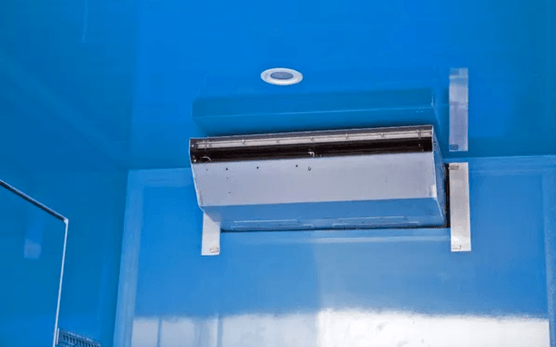Fibreglass has become the material of choice for refrigerated truck insulation in recent years, and it isn’t hard to see why it is preferred to steel. As manufacturers and providers of a fleet of fibreglass truck bodies, we explore the reasons behind the rise of fibreglassing for refrigerated transport.
Why Fibreglass Truck Bodies Are the New Standard for Insulation
The primary purpose of a refrigerated truck is reliable temperature control, and fibreglass is an ideal material for keeping temperatures steady. If the refrigeration unit in your reefer truck fails for any reason, you want to be confident that your cargo will not be spoiled while the problem is fixed. Fibreglass truck bodies have been estimated to be 20-30 per cent more thermally efficient than their steel counterparts, giving you better peace of mind in the case of refrigeration failure.
Cheaper running costs have also contributed to the popularity of fibreglass truck bodies. As a lighter material than steel when used in reefer trucks, customers get the benefits of better fuel economy and less electricity usage. Also, customers have reported that some insurance companies offer coverage for a 10 year life cycle on fibreglass truck bodies, as opposed to a cycle of closer to 5 years for steel trucks.
It’s also worth considering the payload capacity advantages of fibreglass truck bodies. The heavier weight of steel bodies reduces the total payload capacity offered by the vehicle. This means that those who use steel bodied trucks to transport heavy items may be currently using a larger truck than is necessary. Refrigerated transport can be an expensive business, so it is prudent to take advantage of efficiency benefits wherever possible.

How Fibreglass Truck Bodies Work as an Insulator
Fibreglass is a composite, made from plastic mixed with small glass fibres for reinforcement. As a strong and lightweight material that does not conduct heat, it is ideal for use in refrigeration. FIbreglass works to trap heat as it moves to a colder area, allowing the temperature in the colder area to stay stable. Hot air gets trapped between the fibrous strands in fibreglass, effectively preventing conduction of heat.
As a thermally efficient, strong and light material, we think that fibreglass will remain the product of choice for refrigerated truck insulation in the foreseeable future.
Hand-Laid Fibreglass with Scully RSV
Our years of experience as a manufacturer has produced a fibreglassing process that can’t be beaten. All of our fibreglassing is hand-laid and hand-finished, and all work is undertaken in an environment where dust and dirt will not spoil the end product. We know the best time of day to start fibreglassing, as the wrong temperature or humidity can hinder results. Our process produces the best results when it comes to structural integrity.
To view the widest range of fibreglass truck bodies Queensland (LINK TO PAGE) can offer, get in contact with Scully RSV today. You can use our online contact form to make an enquiry, or call 1800 728 559 to speak to our knowledgeable team and find the best option for your situation.
Want to find out more about refrigerated vehicles? Check out our previous posts:
Hire or Buy? 5 Considerations for Refrigerated Transport
Five Important Checks When Buying a Used Refrigerated Truck
The Suppliers Behind Our Refrigerated Transport Fleet
Three Reasons We Trust Hino Trucks

